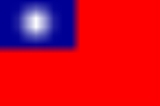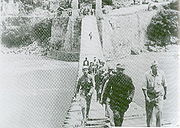
Wei Li-huang
Encyclopedia
Wei Lihuang (16 February 1897-17 January 1960) was a Chinese general who served the Nationalist government throughout the Chinese Civil War
and Second Sino-Japanese War
as one of China's most successful military commanders.
First joining the Kuomintang
(KMT) faction during the early 1920s, Wei Li-huang would rise to become general after the Northern Expedition, a two year campaign to unify China. His later success under Chiang Kai-shek
during the Bandit (Communist) Suppression Campaigns from 1930 to 1934 would earn him the nickname "Hundred Victories Wei".
 During the Second Sino-Japanese War, General Wei would command the First War Area. With the entry of Great Britain and later the United States in the war against Japan, Wei was transferred to southern China as commander of the Nationalist Chinese XI Group Army. He later replaced General Chen Cheng
During the Second Sino-Japanese War, General Wei would command the First War Area. With the entry of Great Britain and later the United States in the war against Japan, Wei was transferred to southern China as commander of the Nationalist Chinese XI Group Army. He later replaced General Chen Cheng
as commander of the Chinese Expeditionary Forces, known as Y-Force. Y-Force consisted of over 100,000 Nationalist soldiers, and participated in major ground operations in support of American General Joseph W. Stilwell's offensive in northern Burma. Unlike many of his contemporaries, Wei was able to work effectively with American commanders.
Beginning his offensive into southern Yunnan
on May 11, 1944 General Wei's troops captured Tengchung on September 15 after two months of heavy fighting. Proceeding southward despite heavy resistance, his forces eventually linked up with Chinese divisions in Wanting, Burma on January 27, 1945. The success of this offensive allowed the Allies to reopen the former Burma Road
supply network to China through Ledo, Burma, now named the Ledo Road
. In concert with existing airlift operations over the Hump
, the Ledo Road enabled overland transport of military supplies from India to Nationalist bases in China.
following the war, Wei Li-huang was placed in command of KMT forces in Manchuria
in October 1947. After being cutoff from land communication with the KMT with the communist capture of Chinchow (Jinzhou
锦州, Liaoning
), Wei Li-huang was supposedly planning for an offensive to recapture the Nationalist provincial capital before he was ordered to withdraw by Chiang Kai-shek
. Shortly before the communist capture of Mukden (Shenyang
), Wei Li-huang would return to southern China
following his replacement by his field commander Du Yuming
in October 1948.
In spite of Wei's earlier success, his tenure in Manchuria was remarkably unsuccessful. He defied orders for more than a year to withdraw, and lost 300,000 troops. Taylor (2009) writes that "Of those, "246,000 were captured, and many if not most were quickly incorporated into the PLA
" (p. 389).
Chiang ordered Wei's house arrest. Wei made his way to Hong Kong
in 1949, and moved to Beijing in 1955, where he would "participate in various organizations of the People's Republic
" (Taylor, 2009, p. 389). Wei would live in the PRC until his death in 1960.
Chinese Civil War
The Chinese Civil War was a civil war fought between the Kuomintang , the governing party of the Republic of China, and the Communist Party of China , for the control of China which eventually led to China's division into two Chinas, Republic of China and People's Republic of...
and Second Sino-Japanese War
Second Sino-Japanese War
The Second Sino-Japanese War was a military conflict fought primarily between the Republic of China and the Empire of Japan. From 1937 to 1941, China fought Japan with some economic help from Germany , the Soviet Union and the United States...
as one of China's most successful military commanders.
First joining the Kuomintang
Kuomintang
The Kuomintang of China , sometimes romanized as Guomindang via the Pinyin transcription system or GMD for short, and translated as the Chinese Nationalist Party is a founding and ruling political party of the Republic of China . Its guiding ideology is the Three Principles of the People, espoused...
(KMT) faction during the early 1920s, Wei Li-huang would rise to become general after the Northern Expedition, a two year campaign to unify China. His later success under Chiang Kai-shek
Chiang Kai-shek
Chiang Kai-shek was a political and military leader of 20th century China. He is known as Jiǎng Jièshí or Jiǎng Zhōngzhèng in Mandarin....
during the Bandit (Communist) Suppression Campaigns from 1930 to 1934 would earn him the nickname "Hundred Victories Wei".
War with Japan

Chen Cheng
Chen Cheng , was a Chinese political and military leader, and one of the main National Revolutionary Army commanders during the Second Sino-Japanese War and the Chinese Civil War. After moving to Taiwan at the end of the Civil War, he served as the Governor of Taiwan Province, Vice President and...
as commander of the Chinese Expeditionary Forces, known as Y-Force. Y-Force consisted of over 100,000 Nationalist soldiers, and participated in major ground operations in support of American General Joseph W. Stilwell's offensive in northern Burma. Unlike many of his contemporaries, Wei was able to work effectively with American commanders.
Beginning his offensive into southern Yunnan
Yunnan
Yunnan is a province of the People's Republic of China, located in the far southwest of the country spanning approximately and with a population of 45.7 million . The capital of the province is Kunming. The province borders Burma, Laos, and Vietnam.Yunnan is situated in a mountainous area, with...
on May 11, 1944 General Wei's troops captured Tengchung on September 15 after two months of heavy fighting. Proceeding southward despite heavy resistance, his forces eventually linked up with Chinese divisions in Wanting, Burma on January 27, 1945. The success of this offensive allowed the Allies to reopen the former Burma Road
Burma Road
The Burma Road is a road linking Burma with the southwest of China. Its terminals are Kunming, Yunnan, and Lashio, Burma. When it was built, Burma was a British colony.The road is long and runs through rough mountain country...
supply network to China through Ledo, Burma, now named the Ledo Road
Ledo Road
The Ledo Road was built during World War II so that the Western Allies could supply the Chinese as an alternative to the Burma Road which had been cut by the Japanese in 1942. It was renamed the Stilwell Road in early 1945 at the suggestion of Chiang Kai-shek...
. In concert with existing airlift operations over the Hump
The Hump
The Hump was the name given by Allied pilots in the Second World War to the eastern end of the Himalayan Mountains over which they flew military transport aircraft from India to China to resupply the Chinese war effort of Chiang Kai-shek and the units of the United States Army Air Forces based in...
, the Ledo Road enabled overland transport of military supplies from India to Nationalist bases in China.
Postwar career
Recalled to northern China to again replace General Chen ChengChen Cheng
Chen Cheng , was a Chinese political and military leader, and one of the main National Revolutionary Army commanders during the Second Sino-Japanese War and the Chinese Civil War. After moving to Taiwan at the end of the Civil War, he served as the Governor of Taiwan Province, Vice President and...
following the war, Wei Li-huang was placed in command of KMT forces in Manchuria
Manchuria
Manchuria is a historical name given to a large geographic region in northeast Asia. Depending on the definition of its extent, Manchuria usually falls entirely within the People's Republic of China, or is sometimes divided between China and Russia. The region is commonly referred to as Northeast...
in October 1947. After being cutoff from land communication with the KMT with the communist capture of Chinchow (Jinzhou
Jinzhou
Jinzhou , is a prefecture-level city of Liaoning province, China. It is a geographically strategic city located in the "Liaoxi Corridor" , which connects land transportation between North China and Northeast China. Jinzhou is China's northernmost seaport and the coastal economic center of West...
锦州, Liaoning
Liaoning
' is a province of the People's Republic of China, located in the northeast of the country. Its one-character abbreviation is "辽" , a name taken from the Liao River that flows through the province. "Níng" means "peace"...
), Wei Li-huang was supposedly planning for an offensive to recapture the Nationalist provincial capital before he was ordered to withdraw by Chiang Kai-shek
Chiang Kai-shek
Chiang Kai-shek was a political and military leader of 20th century China. He is known as Jiǎng Jièshí or Jiǎng Zhōngzhèng in Mandarin....
. Shortly before the communist capture of Mukden (Shenyang
Shenyang
Shenyang , or Mukden , is the capital and largest city of Liaoning Province in Northeast China. Currently holding sub-provincial administrative status, the city was once known as Shengjing or Fengtianfu...
), Wei Li-huang would return to southern China
China
Chinese civilization may refer to:* China for more general discussion of the country.* Chinese culture* Greater China, the transnational community of ethnic Chinese.* History of China* Sinosphere, the area historically affected by Chinese culture...
following his replacement by his field commander Du Yuming
Du Yuming
Du Yuming was a Kuomintang field commander active in the Sino-Japanese War theatre of World War II and in the Chinese Civil War from 1945 to 1949....
in October 1948.
In spite of Wei's earlier success, his tenure in Manchuria was remarkably unsuccessful. He defied orders for more than a year to withdraw, and lost 300,000 troops. Taylor (2009) writes that "Of those, "246,000 were captured, and many if not most were quickly incorporated into the PLA
People's Liberation Army
The People's Liberation Army is the unified military organization of all land, sea, strategic missile and air forces of the People's Republic of China. The PLA was established on August 1, 1927 — celebrated annually as "PLA Day" — as the military arm of the Communist Party of China...
" (p. 389).
Chiang ordered Wei's house arrest. Wei made his way to Hong Kong
Hong Kong
Hong Kong is one of two Special Administrative Regions of the People's Republic of China , the other being Macau. A city-state situated on China's south coast and enclosed by the Pearl River Delta and South China Sea, it is renowned for its expansive skyline and deep natural harbour...
in 1949, and moved to Beijing in 1955, where he would "participate in various organizations of the People's Republic
People's Republic of China
China , officially the People's Republic of China , is the most populous country in the world, with over 1.3 billion citizens. Located in East Asia, the country covers approximately 9.6 million square kilometres...
" (Taylor, 2009, p. 389). Wei would live in the PRC until his death in 1960.

